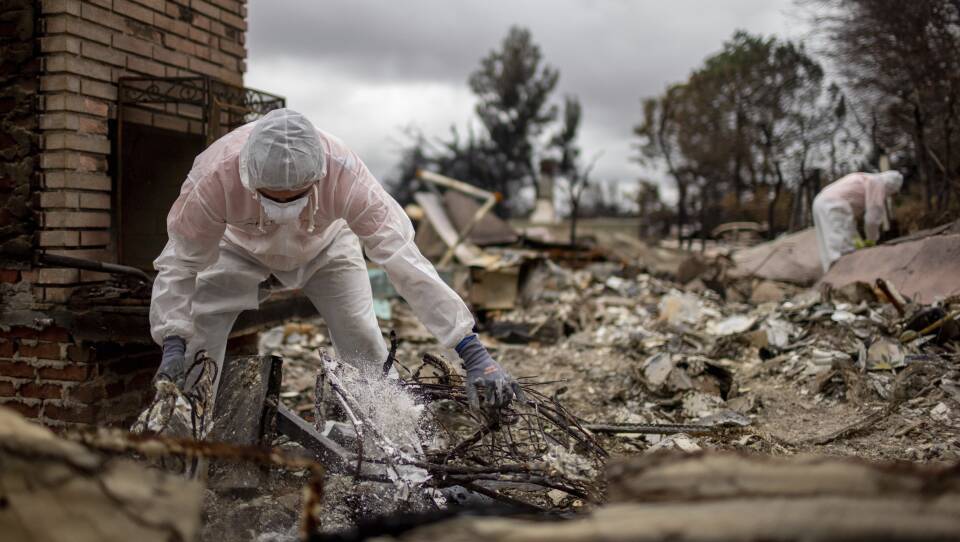Although the fires in Los Angeles have subsided, the after effects for California residents are just beginning.
Health issues caused by the inhalation of fire pollutants is a major concern for Angelenos and firefighters, said Dr. Gregg Furie, a primary care physician at Brigham and Women’s Hospital, where he also serves as the medical director for climate and sustainability and as a member of the Mass General Brigham Climate and Sustainability Leadership Council.
“We already know that particulate-matter pollution — that’s the really fine particles that are produced as a consequence of things burning — are associated with significant health harms,” Dr. Furie said on Under the Radar with Callie Crossley. “And there’s evidence to show that particulate-matter pollution that comes from wildfires is worse than particulate matter pollution that comes from things like burning coal, burning natural gas, burning oil. And there’s even further evidence that the health effects from these urban fires is even greater than just wildfires themselves. We’re seeing combustion of metals like lead, arsenic, chlorine and other toxic pollutants ending up in the air.
”We’re not really prepared for this. We don’t typically see these massive fires in urban areas,“ he added. ”And as a consequence, we haven’t really put systems into place for monitoring the air quality or certainly for figuring out how we can counsel people and protect people, connect people with the appropriate public health and health services and minimize their risk.”
A more long-term issue is what will happen during the dry season after President Donald Trump’s decision to open California dams, which store water for farmers.
“It was a public relations statement that had no basis in science and 18 years of practice working with state regulators, irrigation districts to release water — precious water, might I add — that is expensive, hard to come by and owned by the farmers to somehow, I don’t know, satisfy a public relations campaign, because that’s all it was,” said Beth Daley, executive editor and general manager of The Conversation, U.S. “It didn’t go anywhere, and it didn’t help anything.”
And when it comes to global climate action, Trump on his first day in office followed through on his promise to immediately withdraw again from the United Nations’ Paris Climate Agreement. In order to fill in the gap for the group’s budget, former presidential candidate and New York City Mayor Michael Bloomberg’s philanthropy has offered to pay the U.S.’s 21% share of the budget.
“Bloomberg’s intervention demonstrates how private and non-governmental actors are increasingly shaping climate policy and are reaffirming the urgency of collective action,” said Cabell Eames, advocacy director for the Charles River Watershed Association. “The Paris Agreement came about because over 100 countries walked out of a U.N. meeting to say that their communities were dying, were starving from drought, from floods, and they needed something to be done. And the biggest contributors to climate change needed to step up and help these countries. So whatever the amount is that Bloomberg and his decision to fund the body is, it will be helpful for those other countries to be able to withstand some of the climate extremes that they’ve been facing for decades.”
All that and more in this week’s environmental news roundtable!
Guests
- Beth Daley, executive editor and general manager of The Conversation, U.S.
- Cabell Eames , advocacy director of the Charles River Watershed Association
- Dr. Gregg Furie , primary care physician and Medical Director for Climate and Sustainability at Brigham and Women’s Hospital, member of the Mass General Brigham Climate and Sustainability Leadership Council.
Stories discussed in this week’s roundtable:
- Axios: Climate change made LA fires far more likely, study says
- Los Angeles Times: Acting on Trump’s order, federal officials opened up two California dams
- Los Angeles Times: Is it safe to breathe in L.A.? Lawmakers call for federal action to monitor wildfire pollutants
- US News & World Report: US to Withdraw From Climate Deal on Jan. 27, 2026, Says UN
- Reuters: Michael Bloomberg steps in to help fund UN climate body after Trump withdrawal
- New York Times: Insurers Are Deserting Homeowners as Climate Shocks Worsen
- Martha’s Vineyard Times: ‘I am paying a fortune to insure my home’
- Martha’s Vineyard Times: Vineyard flagged with third highest insurance nonrenewal rate in the country





